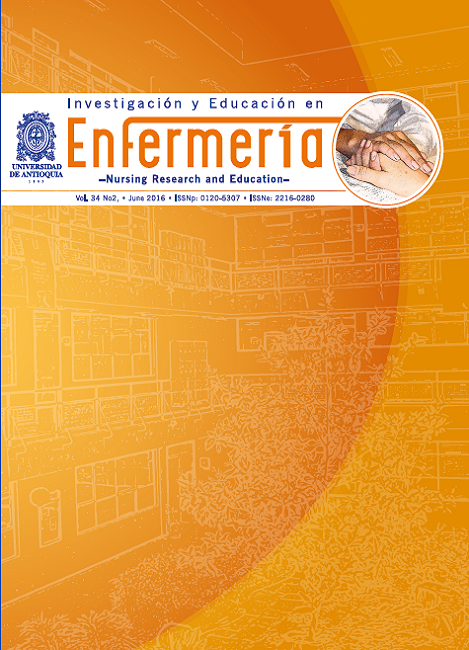Breastfeeding Education: disagreement of meanings
DOI:
https://doi.org/10.17533/udea.iee.323275Keywords:
Health education, qualitative research, breast feeding.Abstract
Objective. This work sought to analyze how educational processes have been developed for breastfeeding in a health institution, starting from the meanings mothers, families, and health staff construct thereon.
Methods. This was qualitative research of ethnographic approach, which included observations during the group educational activities of the programs, focal groups, and interviews of mothers, their families, and the health staff of a hospital unit in the city of Medellín, Colombia. The analysis was guided by the constant comparison method.
Results. The categories emerging from the data were: 1) breast milk is an ideal food. 2) The mothers’ experiences influence upon the breastfeeding practice. 3) Family beliefs sometimes operate as cultural barriers. 4) Disagreements are revealed in the educational process.
Conclusion. The way educational processes have taken place for breastfeeding reveals a break expressed by the scarce interaction between the meanings professionals have constructed on the topic and those the mothers and their families give to the experience of breastfeeding.
How to cite this article: Caicedo NS, Carrillo M, Gómez JG. Breastfeeding Education: disagreement of meanings. Invest. Educ. Enferm. 2016; 34(2):
Downloads
References
(1) Organización Panamericana de la Salud. La alimentación del lactante y del niño pequeño: capítulo modelo para libros de texto dirigidos a estudiantes de medicina y otras ciencias de la salud. Washington D.C.: Organización Panamericana de la Salud; 2010. 108 p.
(2) Dieterich CM, Felice JP, O’Sullivan E, Rasmussen KM. Breastfeeding and health outcomes for the mother-infant dyad. Pediatr. Clin. North Am. 2013;60(1):31–48.
(3) Instituto Colombiano de Bienestar Familiar. Encuesta nacional de la situación nutricional en Colombia [Internet]. Bogotá D.C.: ICBF; 2010 [cited 7 Apr 2016]. Avalilable from: https://www.minsalud.gov.co/sites/RID/Lists/BibliotecaDigital/RIDE/VS/ED/GCFI/Base%20de%20datos%20ENSIN%20-%20Protocolo%20Ensin%202010.pdf
(4) Boyle J. Estilos de etnografía. In: Asuntos críticos en los métodos de investigación cualitativa. Medellín: Universidad de Antioquia; 2003. P. 447.
(5) Goetz JP, Lecompte MD. Etnografía y diseño cualitativo en investigación educativa. Madrid: Ediciones Morata; 1988. 280 p.
(6) Strauss A, Corbin J. Bases de la investigación cualitativa: técnicas y procedimientos paradesarrollar la teoría fundamentada. Medellín: Editorial Universidad de Antioquia; 2002. 340 p.
(7) Arias M, Giraldo C. El rigor científico en la investigación cualitativa. Invest. Educ. Enferm. 2011; 29(3):500–14.
(8) Schardosim J, Cechim P. Exclusive breastfeeding: motivations and disincentives for nursing mothers in Eldorado do Sul, Brazil. Invest. Educ. Enferm. 2013; 31(3):377–84.
(9) dos Santos Monteiro JC, Spanó Nakano AM. O aleitamento materno enquanto uma prática construída: Reflexões acerca da evolução histórica da amamentação e desmame precoce no Brasil. Invest. Educ. Enferm. 2011; 29(2):315–21.
(10) Abu Salem LY, Al Madani MM. Pregnant & Lactating Mothers’ Attitudes and Practice of the Ten Steps to Successful Breastfeeding at King Fahd Hospital of University (KFHU) – Khobar, Saudi Arabia: Appraisal of Baby Friendly Hospital Initiatives. J. Educ. Pract. 2015; 6(11):9–18.
(11) Osorio-Castaño J, Botero-Ortiz B. Factors associated to the duration of exclusive breastfeeding. Invest. Educ. Enferm. 2012; 30(3):390–7.
(12) Jenkins AL, Tavengwa N V, Chasekwa B, Chatora K, Taruberekera N, Mushayi W, et al. Addressing social barriers and closing the gender knowledge gap: exposure to road shows is associated with more knowledge and more positive beliefs, attitudes and social norms regarding exclusive breastfeeding in rural Zimbabwe. Matern. Child. Nutr. 2012; 8(4):459–70.
(13) Nor B, Ahlberg BM, Doherty T, Zembe Y, Jackson D, Ekström E-C, et al. Mother’s perceptions and experiences of infant feeding within a community-based peer counselling intervention in South Africa. Matern. Child. Nutr. 2012; 8(4):448–58.
(14) Peñaranda-Corre F. Las fuerzas sociales y el escenario comunicativo en la educación para la salud: el caso del programa de crecimiento y desarrollo. Cien. Saude Colet. 2011; 16(10):4023–31.
Downloads
Published
How to Cite
Issue
Section
License
Derechos de propiedad / Direitos de Propriedade
English: If the article is accepted for publication, all copyright will be of exclusive property of Investigación y Educación en Enfermería. The text and the graphics included in the publication are exclusive responsibility of the authors and not necessarily reflect the thought of the Editorial Committee.
Español: Si el artículo es aprobado para publicación, todos los derechos son de propiedad de Investigación y Educación en Enfermería. El texto y las gráficas incluidas en la publicación son de exclusiva responsabilidad de los autores y no necesariamente refleja el pensamiento del Comité Editorial.
Português: Se o artigo for aceito para publicação, todos os direitos autorais serão de propriedade exclusiva de Investigación y Educación en Enfermería. O texto e os gráficos incluídos na publicação são de responsabilidade exclusiva dos autores e não refletem necessariamente o pensamento do Comitê Editorial.















